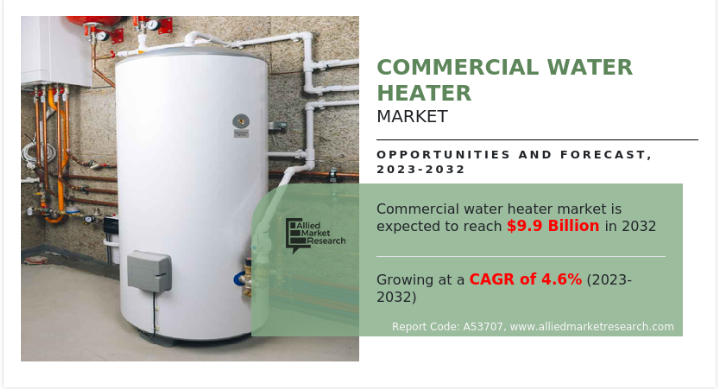
Commercial Water Heater Market Statistics & Research Insights by 2032

Commercial Water Heater
Commercial Water Heater Market Size is projected to hit USD 9.9 billion by 2032
OREGON, PORTLAND, UNITED STATES, July 17, 2023/EINPresswire.com/ --
The commercial water heater market was valued at $6.3 billion in 2022 and is estimated to reach $9.9 billion by 2032, growing at a CAGR of 4.6% from 2023 to 2032. A commercial water heater is a device specifically designed to provide hot water for various commercial and industrial applications. Unlike residential water heaters, which are typically smaller and serve the needs of individual households, commercial water heaters are larger and have a higher capacity to meet the demands of businesses, institutions, and larger-scale operations.
Get a PDF brochure for Industrial Insights and Business Intelligence: https://www.alliedmarketresearch.com/request-sample/54182
When selecting a commercial water heater, it's important to consider the specific hot water requirements of your establishment, local building codes, energy efficiency standards, and any other relevant factors. Consulting with a professional plumber or an HVAC (heating, ventilation, and air conditioning) specialist can help determine the most suitable commercial water heater for your needs.
The major players operating in the commercial water heater industry are A.O. Smith Corporation, Danfoss A/S, Mitsubishi Electric Corporation, STIEBEL ELTRON GmbH and Co. KG, NIBE Industrier AB, Carrier Global Corporation, Robert Bosch GmbH, Rheem Manufacturing Company, Bajaj Electricals Ltd., and Bradford White Corporation. Other players in the industry are Racold, Venus, Nortiz Corporation, Daikin Industries, Valliant, and American Water Heaters.
The growth of the global commercial water heater market is majorly driven by growing infrastructure, especially in public and commercial sectors.
The demand for water heaters that are integrated with renewable sources which are both environmentally friendly as well as pocket-friendly has increased considerably owing to several subsidies provided by governments in many countries.
Such water heaters help curb carbon emissions that contribute to the net-zero targets of many countries. Moreover, it is a great aid in reducing dependence on electricity derived from fossil fuels. Booming commercial sector and real estate sectors in the Asia-Pacific region and advancements in the current technology is the recent commercial water heater market trends.
North America dominated the commercial water heater market and is expected to grow at a CAGR of 4.6% during the forecast period.
Buy This Report (350 Pages PDF with Insights, Charts, Tables, and Figures): https://bit.ly/3MFNlkn
North America dominated the market in 2022, however, Asia-Pacific is expected to grow at a higher CAGR during the projection period. This can be attributed to the surge in demand for commercial real estate in the region as well as infrastructural development in developing economies. The Asia-Pacific is expected to grow at a higher CAGR during the commercial water heater market forecast period owing to the presence of developing economies.
By rated capacity, the market is divided into 0–10 kW, 10–50 kW, 50–100 kW, and above 100 kW. The 10-50 kW segment dominated the market share for 2022 and is expected to maintain its leading position during the projection period. This is attributed to the fact that heaters with 10–50 kW capacity are widely used in cafes, hotels, hostels, restaurants, and offices.
Depending on the storage capacity, the market is classified into below 500 liters, 500–1,000 liters, 1,000–3,000 liters, 3,000–4,000 liters, and above 4,000 liters. The below 500 liters segment is anticipated to grow at a notable CAGR during the forecast period. This is attributed to the potential demand from small commercial buildings, especially with an increased focus on solar commercial water heaters that are being installed on a large scale.
Bio-fueled water heaters have almost zero maintenance cost and prolonged service life, which is its key benefit. Using wood as solid fuel in place of fossil fuels helps to prevent long-term climate changes since the carbon dioxide released during the combustion was actually absorbed while the tree was growing, so they are essentially carbon neutral. Modern solid-fueled commercial water heaters are fuel efficient, much cleaner, and safer.
Enquiry Before Buying (350 Pages) Informative Report PDF: https://www.alliedmarketresearch.com/purchase-enquiry/54182
They use wood, which is either freely available or at a cheap rate, thereby helping to cut down electricity bills. Thus, multiple benefits associated with bio-fueled waters boost their demand across the globe, thereby augmenting market growth.
Similar Reports:-
Gas Water Heater Market by Product Type (Instant, Storage), by Installation Type (Outdoor, Indoor), by Fuel Type (Natural Gas, LPG), by Application (Residential, Commercial, Industrial): Global Opportunity Analysis and Industry Forecast, 2021-2031
Global Tankless Water Heater Market by Type (Condensing, Non-Condensing), by Energy Source (Electric, Gas), by Energy Factor (0.80 to 0.90 EF, 0.91 to 0.99 EF), by End User (Residential, Commercial): Global Opportunity Analysis and Industry Forecast, 2021-2031
David Correa
Allied Analytics LLP
1 800-792-5285
email us here
Distribution channels: Energy Industry, Environment
Legal Disclaimer:
EIN Presswire provides this news content "as is" without warranty of any kind. We do not accept any responsibility or liability for the accuracy, content, images, videos, licenses, completeness, legality, or reliability of the information contained in this article. If you have any complaints or copyright issues related to this article, kindly contact the author above.
Submit your press release